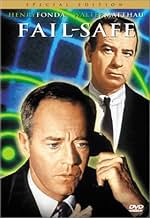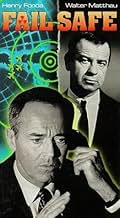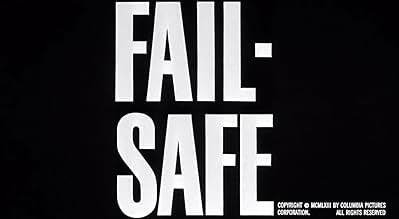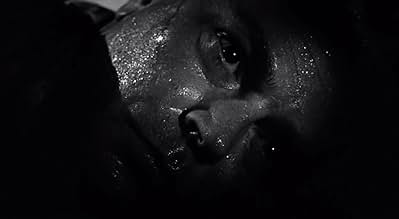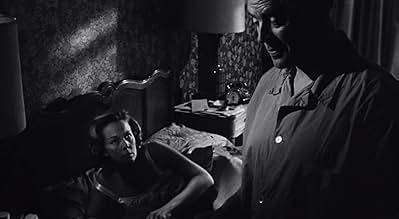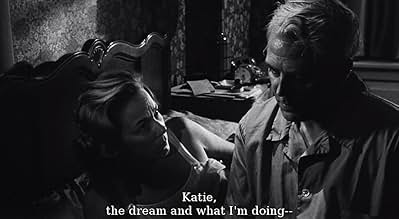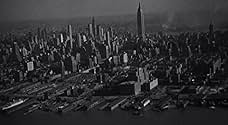A technical malfunction sends American bombers to Moscow to deliver a nuclear attack. Can all-out war be averted?A technical malfunction sends American bombers to Moscow to deliver a nuclear attack. Can all-out war be averted?A technical malfunction sends American bombers to Moscow to deliver a nuclear attack. Can all-out war be averted?
- Nominated for 1 BAFTA Award
- 3 nominations total
Featured reviews
This movie was great. It may seem boring to many younger teenage crowds, but you need to take into consideration the era in which this was made. The SFX were terrific for 1964. It was heart pounding and very scary at times. The acting skills of the entire cast are superb. I highly recommend this movie to anyone who wants to know more about the cold war. 4.5 of 5 stars!
I mentioned in another comment about a series of movies made during the mid-1960's, that I call 'political noir'.
These films are easy to spot, in that there were made in B&W, dealt with a American institutional crisis and seemed to always feature Henry Fonda somewhere in the cast.
On all three counts, this film fits that criteria.
Because this film came out around the time of "Dr Strangelove", it was somewhat overshadowed, and because of the nearly identical plots, there was even talk of plagiarism, even though this film was based on a novel by two Washington-based journalists with a remarkable insight of the workings of government and was directed by Sidney Lument, one of the cinema's great directors.
Also, unlike "Dr Strangelove", which seemed to receive major studio backing, money and the freedom offered by being produced in Great Britain where this satire was more appreciated, "Fail-Safe" was independently produced in New York on a limited budget, without official backing by the Defense Department, which explains all of the flaws complained of by many viewers and posters on this site.
Yet in spite of these limitations, Lument pulls off a major coup by presenting us with an authentic piece of Armeggeddon.
In a real-time view, we watch as a million-to-one technical fault 'orders' a wing of American bombers to attack Soviet Russia, and the Defense Department and the President are helpless in trying to stop it.
We are also witness to how our military operates, trying to plan military policy, and debating theory and possible results.
Such things are sensible and harmless as far as these things go, until 'the day comes' when reality displaces theory.
Walter Matthau, who is more well-known for his comic talents ("The Odd Couple", "Grumpy Old Men"), than being an accomplished dramatic actor, is shown at the height of his powers as Prof. Groteschelle; a defense policy wonk, whose obsession with defense preparedness and Marxist theory reaches the point of detachment from human emotion, as he blindly recommends that no action be taken and the bombers be allowed to complete their mission, resulting in 'final victory' over Communism.
This is in direct contradiction to General Black, a compassionate Air Force officer who is also an intellectual, who desperately urges that every means be made to stop the bombers before it is too late.
However, it turns out to be too late, at least on the American side.
We watch how technology becomes a hindrance, as much as the distrust between the two superpowers seems to be, as the President and the Soviet Premier desperately try to seek a solution to this disaster.
The tragedy about this is that someone thought they should remake this in 2000, which in a way is flattering but certainly could not come close to the original work.
But, this only proves that the subject of 'accidental war' is still a concern.
However, how can one do better than Henry Fonda ???
These films are easy to spot, in that there were made in B&W, dealt with a American institutional crisis and seemed to always feature Henry Fonda somewhere in the cast.
On all three counts, this film fits that criteria.
Because this film came out around the time of "Dr Strangelove", it was somewhat overshadowed, and because of the nearly identical plots, there was even talk of plagiarism, even though this film was based on a novel by two Washington-based journalists with a remarkable insight of the workings of government and was directed by Sidney Lument, one of the cinema's great directors.
Also, unlike "Dr Strangelove", which seemed to receive major studio backing, money and the freedom offered by being produced in Great Britain where this satire was more appreciated, "Fail-Safe" was independently produced in New York on a limited budget, without official backing by the Defense Department, which explains all of the flaws complained of by many viewers and posters on this site.
Yet in spite of these limitations, Lument pulls off a major coup by presenting us with an authentic piece of Armeggeddon.
In a real-time view, we watch as a million-to-one technical fault 'orders' a wing of American bombers to attack Soviet Russia, and the Defense Department and the President are helpless in trying to stop it.
We are also witness to how our military operates, trying to plan military policy, and debating theory and possible results.
Such things are sensible and harmless as far as these things go, until 'the day comes' when reality displaces theory.
Walter Matthau, who is more well-known for his comic talents ("The Odd Couple", "Grumpy Old Men"), than being an accomplished dramatic actor, is shown at the height of his powers as Prof. Groteschelle; a defense policy wonk, whose obsession with defense preparedness and Marxist theory reaches the point of detachment from human emotion, as he blindly recommends that no action be taken and the bombers be allowed to complete their mission, resulting in 'final victory' over Communism.
This is in direct contradiction to General Black, a compassionate Air Force officer who is also an intellectual, who desperately urges that every means be made to stop the bombers before it is too late.
However, it turns out to be too late, at least on the American side.
We watch how technology becomes a hindrance, as much as the distrust between the two superpowers seems to be, as the President and the Soviet Premier desperately try to seek a solution to this disaster.
The tragedy about this is that someone thought they should remake this in 2000, which in a way is flattering but certainly could not come close to the original work.
But, this only proves that the subject of 'accidental war' is still a concern.
However, how can one do better than Henry Fonda ???
This cold war era classic certainly made you think if it's storyline was possible. The plausibility of the solution to avert an all-out retaliatory nuclear war that the American and Soviet leaders decide on in the film is still debated but this film captures the essence of the cold war paranoia in this film directed by Sidney Lumet. This was Lumet's seventh film of his career and he was known for his dramas that were screen stage plays with 12 Angry Men, Long Days Journey Into Night and The Pawnbroker. Henry Fonda heads up an excellent cast including Walter Matthau, Fritz Weaver, Larry Hagman, Dan O'Herlihy, Ed Binns and Frank Overton. In 1958 author Peter George wrote the novel Red Alert and would go on to win an out of court settlement over the authors of Fail Safe, Eugene Burdick and Harvey Wheeler, on plagiarism charges. Interestingly the dramatic novel Red Alert would serve as the basic premise for this dramatic film and in the dark comedy Dr. Strangelove which were both released in the same year by the same studio. Good tension and drama from this script by Walter Bernstein. Weather it could or couldn't have happened as it did in this story it's still a compelling film 42 years later. I would give it an 8.5 out of 10.
See "Fail- Safe."
I couldn't sleep without the light on after I saw this fantastically fabricated film. When a machine malfunctions and signals a U.S bomber to drop atomic missiles over Moscow, the Soviet Premier and the U.S President struggle to save the world from nuclear holocaust. The last three minutes are among the most powerful I've seen in a movie.
I couldn't sleep without the light on after I saw this fantastically fabricated film. When a machine malfunctions and signals a U.S bomber to drop atomic missiles over Moscow, the Soviet Premier and the U.S President struggle to save the world from nuclear holocaust. The last three minutes are among the most powerful I've seen in a movie.
I was thoroughly in suspense throughout this magnificent film. I almost felt as if I was watching World War III unfurl like the Gulf War did on CNN, it was that convincing. Fonda as the President and Matthau as the Professor, in truly memorable performances, are superb in their roles and indeed the entire cast is strongly competent. Besides the unforgettable ending, by way of the President's unthinkable concession, are the arguments and attitudes of the Professor and Colonel Cascio. At the time it must have been very tempting to many hawks in Cold War administrations to end the deadlock whenever a seemingly decisive opening presented itself. I strongly recommend this film for its believablity and realism and even the final credits! 10/10.
Did you know
- TriviaThe "computer-generated" image on the control-room screen (including the map of the world, the planes and the explosions) was entirely drawn and animated by hand.
- GoofsThe interior shots of the bombers, Convair B-58 Hustlers (see Trivia), actually were shot inside of a commercial airline simulator then under repair at a a New York airport. The three crew members sit within feet of each other, in an open cockpit layout. In an actual B-58, the world's first fly-by-wire and supersonic bomber (and capable of twice the speed of sound), the three-man crew of pilot, bombardier/navigator, and defense systems specialist were seated in-line and had no physical contact with one another. To make survivable ejection possible on such a high-speed aircraft, each compartment was specifically designed as wholly contained clam-shell "pod" that would be ejected intact if the need arose. As a result, the crew had to rely on an internal telecommunications system to talk, or a string-and-pulley system that ran along the cabin wall to exchange notes if those systems failed. It's speculated that this pod design was incorporated as a presidential safeguard on modern 747 versions of Air Force One, as implied in the film Air Force One (1997).
- Quotes
US Ambassador: [over the phone] I can hear the sound of explosions from the north east. The sky is very bright. All lit up.
[phone melts and high pitched whining sound starts]
- Crazy credits[FINAL CREDIT]: The producers of this film wish to stress that it is the stated position of the Department of Defense and the United States Air Force that a rigidly enforced system of safeguards and controls insure that occurrences such as those depicted in this story cannot happen
- ConnectionsFeatured in Henry Fonda: The Man and His Movies (1982)
Details
- Release date
- Country of origin
- Languages
- Also known as
- Límite de seguridad
- Filming locations
- Westbury, Long Island, New York, USA(Roosevelt Field: President's bunker)
- Production company
- See more company credits at IMDbPro
Box office
- Gross US & Canada
- $3,924,000
- Runtime
- 1h 52m(112 min)
- Color
- Aspect ratio
- 1.85 : 1
Contribute to this page
Suggest an edit or add missing content

![Watch Trailer [OV]](https://m.media-amazon.com/images/M/MV5BZjExYTg4YzctNGIwZC00ZWUwLWFhOWItNTJhYjRiY2UzZjk4XkEyXkFqcGdeQXRyYW5zY29kZS13b3JrZmxvdw@@._V1_QL75_UX500_CR0)
